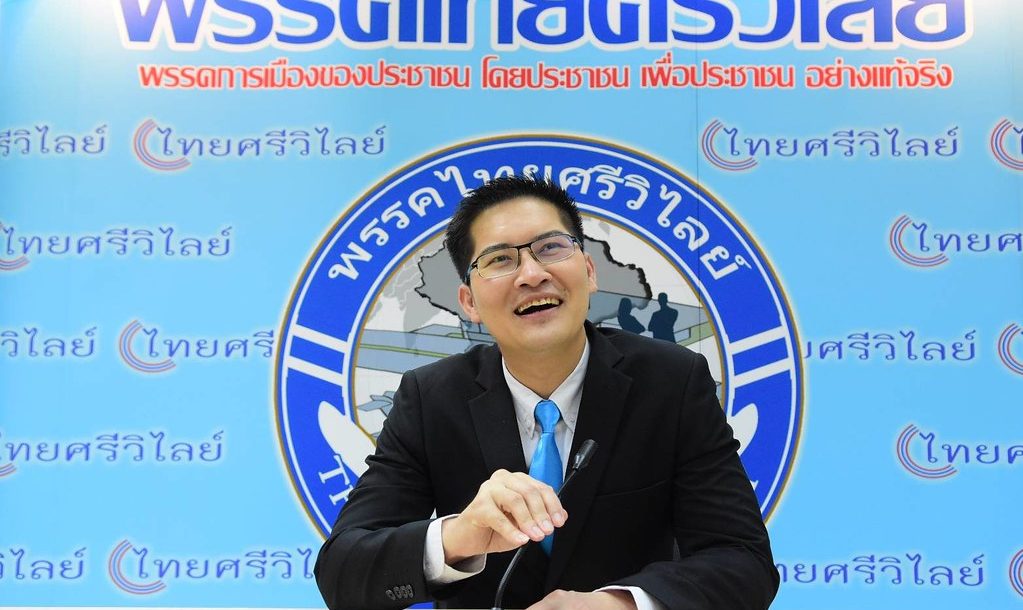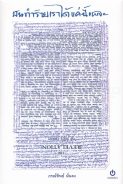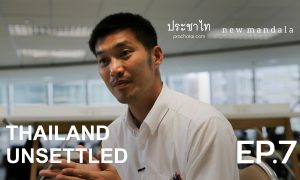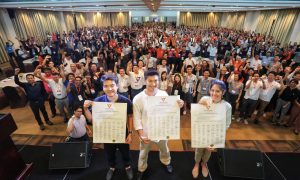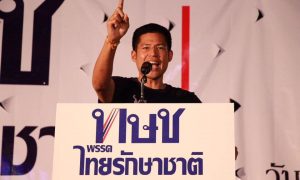Over the last week, several online writers have written articles comparing Mongkolkit Suksintharanon, aged 37 and the head of the Thai Civilized Party, with Thanathorn Juangroongruangkit, aged 40 and the chairman of Future Forward Party.
The basis of the comparison lies in Future Forward having received 6.3 million votes (out of 35 million eligible voters) in the recent election, with much of the support coming from younger generations and first-time voters. Yet merely a day before Thailand’s newly-elected legislative assembly was scheduled to open, the Constitutional Court ordered Thanathorn to temporarily cease performing his duties as a member of parliament while judges consider allegations from the Election Commission that he illegally owned shares in media companies while participating in the election. Moreover, the Constitutional Court has expedited the trial process. For example, the Court summoned Thanathorn’s mother to give testimony in the morning, while the summons letter only reached his mother’s house in the afternoon—that is, after she had already given testimony. Netizens, including Thanathorn himself, have interrogated the injustice the Future Forward Party leader is currently facing, in the form of both the rushing of the trial and the Court’s acceptance in the first place of a case that is almost entirely without basis. Subsequently, we have not been able to see Thanathorn perform his duties as a member of parliament from the very first day that the lower house convened.
In contrast, we have been able to watch Mongkolkit’s unsettling role since parliament convened, even though the Thai Civilized Party received only some 60,000 votes. The Thai Civilized Party was able to receive a seat in the legislature even though the organic law on the election of members of parliament outlines a method for the calculation of party-list seats whereby one party-list seat requires a minimum of 71,000 votes. The Election Commission chose to interpret the calculation method in another way, while the Constitutional Court declined to rule on the final party-list calculation formula used and deferred the power to interpret to the Election Commission. As a consequence, representatives from 11 political parties who received as little as 30,000–70,000 votes were allocated party-list seats in the new legislative assembly, including the Thai Civilized Party.
After the Election Commission released the official election results, spaces both online and offline were flooded with a continual stream of news about Mongkolkit—beginning with the news that Thai Civilized and the other 10 small parties which benefitted from the Election Commission’s interpretation of the party-list seat calculation formula had all announced their support for junta leader General Prayuth Chan-ocha’s bid to continue on as the country’s prime minister. The parties justified their stance by appealing to the need to overcome “the political crisis”, even though Mongkolkit and Thai Civilized had previously campaigned on a contradictory platform.
Netizens subsequently uncovered records of Mongkolkit campaigning on a stance of opposing dictatorial rule and rejecting the maintenance of the existing regime in any form. As the clips made their way around the internet, a journalist questioned Mongkolkit on the hypocrisy. His answer—“I was just talking, saying anything to get into parliament first”—elicited anger from a large number of Thais and sparked further excavations of prior public statements.
Many people have already written pieces analysing Mongkolkit’s character, so I will not attempt to do so here. I would like us to consider inquiries that perhaps we have overlooked. Are we looking at anything more than Mongkolkit’s lies? Thai Civilized Party received 60,354 votes, which means that some 60,000 Thais elected Mongkolkit as a representative in parliament. Tens of thousands of votes is no meagre amount. With just a few more votes, he would have been entitled to a party-list seat even under the original organic law.
Without a doubt, one factor to consider in explaining the votes received by Thai Civilized Party is its status as a small party, and the resource constraints such parties tend to face. Small parties are unable to compete financially with large parties, particularly on a national level where sharply drawn political divisions compel most Thais to choose a major party. Under these political conditions, a small political party such as Thai Civilized must pull votes by competing for media coverage in order to maximize exposure.
To unveil his political party prior to the election, the very first thing that Mongkolkit did was organise a press conference to release the party’s policies, where he called on Prayuth to increase the punishment for corrupt politicians, business people and civil servants from imprisonment to include additionally caning and flogging. Through a public demonstration of the caning and flogging he was proposing, Mongkolkit succeeded in drawing the attention of the media and a large number of Thais. As his news releases gained increasing momentum, Mongkolkit proceeded to present more absolutist and violent party policies: live broadcasting of executions, a dramatic reduction in the prime minister’s salary, and a policy of stringently and violent pursuing cases and suppressing people who think differently—whether they reside in or outside of the country—particularly cases related to the institution of the monarchy.
It is worth noting that that part of Thai Civilized’s platform was opposing the continuation of Prayuth’s rule, rejecting dictatorship in all forms and undoing the junta’s orders. But anyone who admired these policies would have probably elected to vote for a major party with a clear anti-Prayuth standpoint over Thai Civilized. As such, the 60,000 people who voted for Thai Civilized, if there were not the friends and families of candidates, most likely believed in the policies and selling points of the party. Though its policies collectively had the form of a fishnet—scattered, jumbled and covering a large number of issues—they were united by their extremism, violence and absolutism.
Mongkolkit’s decision to support the continuation of Prayuth’s rule, and his confession that his opposition to the junta leader was only opportunistic rhetoric aimed at getting into parliament, has disillusioned many Thais who are no longer confident he will fulfil his campaign promises. Those wavering extend even to within his own party, with some members enthusiastically joining in public criticisms of the Thai Civilized leader.
All the same, the extent of support for Mongkolkit is an indication of that dictatorial power and the use of violence to punish those who violate the law is popular among no small number of Thais. Though the voters who supported him may now be disappointed in Mongkolkit, that does not mean that will cease to hope for the emergence of another political champion. And though some may not like the current junta, that does not mean they do not want dictatorial leaders at all. The political rise of Mongkolkit has pushed me to wonder: who are these people and where are they found in our society? Has the visibility of groups in Thai society who support dictatorial rule awakened younger generations and other demographics to the dangers contained in the ongoing emergence of highly authoritarian policies?
The campaign platforms of Thai political parties tend to be constituted by policies that assist, help, promote, or inject various goods into society at large—they are policies that promote the freedom of the people. But such policies promote only “positive liberties”, whereby people have the freedom to be or do those things that fulfil their individual potential. But the policies of Thai political parties almost never speak of “negative liberties”, whereby people have the freedom to act without other powers interfering or obstructing—especially the reigning in of the state from infringing on spaces where individual freewill should reign.
I do not raise these issues to suggest that positive liberties are not meaningful, but only to suggest that Thai society should show interest in developing and improving the quality of negative liberties. As the English philosopher Isaiah Berlin cautioned, “The notion of positive freedom has led, historically, to even more frightful perversions … This goes back to the naive notion that there is only one true answer to every question: if I know the true answer and you do not, and you disagree with me, it is because you are ignorant; if you knew the truth, you would necessarily believe what I believe; if you seek to disobey me, this can be so only because you are wrong, because the truth has not been revealed to you as it has been to me. This justifies some of the most frightful forms of oppression and enslavement in human history, and it is truly the most dangerous, and, in our century in particular, the most violent, interpretation of the notion of positive liberty”.
When society is concerned with only objectives, methods cease to be of concern to those who wield the power to turn those objectives into reality. It is under such conditions that the seeds of dictatorial power blossom. Once we take up the lens of negative liberties to consider Mongkolkit’s popularity among a certain section of Thai society, we can begin to see how the appeal of dictatorial forms of power may be rooted in the experiences of the Thai people in being continuously exposed to seizures of power in the form of coups.
Live and die with dignity: a publisher vs. a kingdom
Amid assassinations and forced disappearances of Thai dissidents abroad, a dissident publisher reflects on what it means to “survive” under “Democracy with the King as the Head of State".
Developing policies concerned with negative liberties is of upmost importance. These include guarantees to the privacy of personal information, preventions against the abuse of state power in internet surveillance, and guarantees to fundamental human rights for all people in our society.
The case of Mongkolkit reflects a wider problem of a deeply rooted yearning in Thai society for authoritarian rule. We must not through inattention allow state power to extend further than is necessary; we must be wary of and reject figures and policies which seek to place limitations on individual liberties. And as Timothy Snyder has said of tyranny, we must “make eye contact and small talk” to bring down dictatorial power and build democracy. We may not be able to achieve such things through communication alone, but we who co-exist in the same society must still strive to learn, patiently listen and understand those who think differently to us.
ในสัปดาห์ที่ผ่านมา ผู้คนจำนวนมากในสังคมออนไลน์ต่างเขียนข้อความเปรียบเทียบ นายมงคลกิตติ์ สุขสินธารานนท์ หัวหน้าพรรคไทยศรีวิไลย์ วัย 37 ปี กับ นายธนาธร จึงรุ่งเรืองกิจ หัวหน้าพรรคอนาคตใหม่ วัย 40 ปี ด้วยเหตุที่พรรคอนาคตใหม่ได้รับคะแนนเสียงจากคนไทย โดยเฉพาะคนรุ่นใหม่ รวมมากถึง 6.3 ล้านคน (จากผู้มาใช้สิทธิเลือกตั้ง 35 ล้านคน) แต่นายธนาธรที่เป็นหัวหน้าพรรคกลับถูกศาลรัฐธรรมนูญพิพากษาให้หยุดการปฏิบัติหน้าที่เป็นสมาชิกสภาผู้แทนราษฎรเป็นการชั่วคราวจากกรณีการถือหุ้นสื่อ ก่อนวันเปิดประชุมสภาผู้แทนราษฎรเพียง 1 วัน ประกอบกับการเร่งรัดกระบวนการพิจารณาคดีของศาลรัฐธรรมนูญ เช่น ศาลออกใบนัดสืบพยานและเรียกแม่ของนายธนาธรเข้าไปให้ปากคำในช่วงเช้าของวัน แต่ใบนัดสืบพยานที่ออกด้วยความเร่งรีบกลับมาถึงที่บ้านของแม่ของเขาในช่วงบ่ายซึ่งล่วงเลยกำหนดนัดสืบพยานไปแล้ว เป็นต้น ประชาชนในสังคมออนไลน์รวมถึงนายธนาธรต่างตั้งคำถามกับความอยุติธรรมที่เขากำลังเผชิญ ทั้งความเร่งรีบของกระบวนการการพิจารณาคดีดังกล่าว และความไม่สมเหตุสมผลของการรับพิจารณาคดีที่แทบไม่มีมูลตั้งแต่ต้น ด้วยเหตุนี้ทำให้เราไม่ได้เห็นนายธนาธรปฏิบัติหน้าที่เป็นสมาชิกสภาผู้แทนราษฎรตั้งแต่วันแรกของการเปิดประชุมสภาฯ
ทว่าเรากลับได้เห็นบทบาทอันน่ากระอักกระอ่วนของนายมงคลกิตติ์ตั้งแต่วันแรกของการเปิดประชุมสภาฯ ทั้งที่พรรคไทยศรีวิไลย์ของเขาได้รับคะแนนเสียงจากคนไทยเพียง 6 หมื่นคะแนน และตามพระราชบัญญัติประกอบรัฐธรรมนูญว่าด้วยการเลือกตั้งสมาชิกสภาผู้แทนราษฎรกำหนดระเบียบวิธีการคำนวณว่า พรรคการเมืองจะได้รับที่นั่งในระบบบัญชีรายชื่อ 1 ที่นั่งก็ต่อเมื่อได้รับคะแนนเสียง 7.1 หมื่นคะแนน แต่ด้วยการรังสรรค์ของคณะกรรมการการเลือกตั้ง (กกต.) ที่ตีความให้ระเบียบวิธีการคำนวณเป็นอีกแบบหนึ่ง ประกอบกับศาลรัฐธรรมนูญมีมติไม่รับตีความระเบียบวิธีดังกล่าวและให้อำนาจ กกต. เป็นผู้ตีความด้วยตนเอง ทำให้มีพรรคการเมืองที่มีคะแนนเสียง 3 หมื่นถึง 7 หมื่นเสียงเป็นจำนวนมากถึง 11 พรรคได้รับที่นั่งเป็นสมาชิกสภาผู้แทนราษฎรประเภทบัญชีรายชื่อ รวมถึงนายมงคลกิตติ์จากพรรคไทยศรีวิไลย์นี้ด้วย
หลังจาก กกต. ประกาศผลการเลือกตั้งอย่างเป็นทางการ พื้นที่ข่าวต่าง ๆ ทั้งออนไลน์และออฟไลน์ต่างเต็มไปด้วยข่าวของนายมงคลกิตติ์อย่างต่อเนื่องอยู่หลายวัน เริ่มต้นจากข่าวที่นายมงคลกิตติ์และพรรคการเมืองขนาดเล็กอีก 10 พรรคซึ่งได้ผลประโยชน์จากการตีความวิธีการคำนวณของ กกต. ต่างร่วมกันลงนามและประกาศสนับสนุนนายประยุทธ์ จันทร์โอชา (นายกรัฐมนตรีปัจจุบันและหัวหน้าคณะรัฐประหารครั้งล่าสุดของไทย) ให้เป็นนายกรัฐมนตรีสมัยที่สอง โดยอ้างว่าเป็นการตัดสินใจเพื่อก้าวข้ามวิกฤติการณ์ทางการเมือง ทั้งที่ก่อนการเลือกตั้ง นายมงคลกิตติ์และพรรคไทยศรีวิไลย์เคยปราศรัยหาเสียงในอีกแบบหนึ่ง คนในสังคมออนไลน์จึงขุดประวัติการพูดของนายมงคลกิตติ์ที่เคยหาเสียงไว้ว่า เขาต่อต้านอำนาจเผด็จการและการสืบทอดอำนาจทุกรูปแบบ เมื่อคลิปของเขาถูกเผยแพร่และเป็นที่วิพากษ์วิจารณ์ จึงมีนักข่าวไปสัมภาษณ์เขาถึงประเด็นดังกล่าว เขาตอบว่า “ผมเพียงแค่พูด พูดอย่างไรก็ได้เพื่อเข้าสภาให้ได้ก่อน” คำตอบนี้ของเขาสร้างความโกรธเคืองต่อคนไทยจำนวนมาก และเป็นเหตุสำคัญที่ทำให้คนเริ่มขุดประวัติการสัมภาษณ์อื่น ๆ ของเขา
นายมงคลกิตติ์เคยให้สัมภาษณ์โอ้อวดว่าตนเองเคยเป็นนักเลงคุมมหาวิทยาลัย เป็นหัวหน้ากลุ่มเตะต่อยตีรันฟันแทงของมหาวิทยาลัย และเป็นคนสำคัญของชมรมเพาะกายของมหาวิทยาลัยที่มีสมาชิกห้าพันคน จากคำให้สัมภาษณ์นี้ทำให้ศิษย์ปัจจุบันและศิษย์เก่าของมหาวิทยาลัยดังกล่าวออกมาตอบโต้ว่าไม่เป็นความจริง มหาวิทยาลัยไม่ได้มีสภาพป่าเถื่อนแบบนั้น และนายมงคลกิตติ์ก็ไม่ได้เป็นบุคคลสำคัญใด ๆ ของชมรมและของมหาวิทยาลัย ศิษย์ของมหาวิทยาลัยดังกล่าวโกรธแค้นและรวมตัวกันล่ารายชื่อเพื่อเสนอถอดถอนนายมงคลกิตติ์ออกจากตำแหน่งสมาชิกสภาผู้แทนราษฎร (ตามรัฐธรรมนูญไทยปัจจุบัน คนไทยไม่สามารถรวบรวมรายชื่อเพื่อยื่นถอดถอนนักการเมืองได้)
มีหลายคนเขียนบทความวิเคราะห์บุคลิกภาพของนายมงคลกิตติ์ไว้แล้ว ในที่นี้จะไม่ขอวิเคราะห์ในส่วนนี้ แต่ขอให้เราร่วมกันพิจารณาในส่วนที่เราอาจจะมองข้ามไป เราสังเกตเห็นอะไรหรือไม่นอกเหนือจากการโกหกของนายมงคลกิตติ์ พรรคของนายมงคลกิตติ์ได้รับคะแนนเสียง 60,354 คะแนน ซึ่งหมายความว่ามีคนไทยจำนวนมากถึง 6 หมื่นคนเลือกเขาเป็นสมาชิกสภาผู้แทนราษฎร จำนวนหกหมื่นคะแนนนี้ไม่ได้เป็นจำนวนที่น้อยเลย อีกเพียงไม่กี่คะแนนเขาก็มีคะแนนเสียงเพียงพอจะได้รับ 1 ที่นั่งตามระเบียบวิธีของพระราชบัญญัติแล้ว
แน่นอนว่าสาเหตุหนึ่งที่ทำให้พรรคไทยศรีวิไลย์ได้รับคะแนนเสียงหลักหมื่นคือ พรรคไทยศรีวิไลย์เป็นพรรคขนาดเล็กและมีเงินทุนของพรรคน้อยจึงเสียเปรียบพรรคการเมืองขนาดใหญ่ โดยเฉพาะอย่างยิ่งในสนามการเมืองระดับประเทศที่มีการแบ่งฝ่ายกันอย่างชัดเจน ทำให้คนไทยตัดสินใจที่จะเลือกพรรคการเมืองขนาดใหญ่มากกว่า ดังนั้น ในสถานการณ์การเมืองไทยลักษณะนี้ พรรคไทยศรีวิไลย์ซึ่งเป็นพรรคการเมืองขนาดเล็กจะต้องหาเสียงโดยวิธีการแย่งชิงพื้นที่สื่อเพื่อทำให้คนรู้จักมากที่สุด สิ่งแรกที่นายมงคลกิตติ์ทำเพื่อนำเสนอพรรคการเมืองของเขาก่อนการเลือกตั้งคือ การจัดแถลงนโยบายพรรค โดยเรียกร้องให้ประยุทธ์เพิ่มมาตรการลงโทษนักการเมือง นักธุรกิจ และข้าราชการที่ทุจริต จากเดิมเป็นโทษจำคุกให้เป็นการเฆี่ยนด้วยไม้เรียวและการโบยด้วยไม้พลอง เขาทำให้สื่อและคนไทยจำนวนมากพูดถึงพรรคของเขาด้วยการสาธิตการเฆี่ยนและการโบยตามแนวทางของเขาออกสื่อสาธารณะ เมื่อการแถลงข่าวของเขาได้รับกระแส เขาก็นำเสนอนโยบายพรรคที่มีแต่ความเด็ดขาดและรุนแรง ทั้งนโยบายการถ่ายทอดสดการประหารชีวิตนักโทษเพื่อให้คนไทยเห็นเป็นตัวอย่างและยำเกรงกฎหมาย นโยบายการตัดเงินเดือนนายกรัฐมนตรีลงในอัตราที่สูง และนโยบายการดำเนินคดีและปราบปรามคนที่คิดเห็นแตกต่างทั้งที่พักอาศัยอยู่ในและนอกประเทศอย่างรุนแรงเด็ดขาด โดยเฉพาะอย่างยิ่งคดีเกี่ยวกับสถาบันพระมหากษัตริย์
น่าสังเกตว่า จุดขายของพรรคไทยศรีวิไลย์ก็คือ การต่อต้านการสืบทอดอำนาจของประยุทธ์ ต่อต้านเผด็จการทุกรูปแบบ และยกเลิกคำสั่งของคณะรัฐประหารทั้งหมด ถ้าหากคนจำนวนหนึ่งชื่นชอบนโยบายนี้ คนเหล่านี้คงจะตัดสินใจลงคะแนนให้พรรคการเมืองขนาดใหญ่ที่อยู่ขั้วตรงข้ามกับประยุทธ์อย่างชัดเจนมากกว่าจะตัดสินใจเลือกพรรคไทยศรีวิไลย์ ดังนั้น หากคน 6 หมื่นคนที่เลือกพรรคไทยศรีวิไลย์ไม่ได้เป็นญาติสนิทมิตรสหาย เขาก็คงเป็นคนที่ศรัทธาในนโยบายและจุดขายของพรรค ซึ่งมีลักษณะหว่านแห กระจัดกระจายไปหลาย ๆ เรื่อง แต่ทั้งหมดล้วนมีจุดร่วมคือ ความสุดโต่ง ความรุนแรง และความเด็ดขาด
การตัดสินใจลงนามสนับสนุนการสืบทอดอำนาจ และการสารภาพว่าการต่อต้านประยุทธ์ของเขาเป็นเพียงการพูดเพื่อให้ได้เข้าสภา ทำให้คนไทยหลายคนหมดศรัทธาในตัวเขา ไม่เชื่อมั่นแล้วว่าสิ่งที่เขาเคยหาเสียงไว้นั้นจะสามารถทำได้จริง แม้กระทั่งคนในพรรคของเขาเองบางคนก็หมดศรัทธา ไปร่วมวงด่าเขากับคนอื่น ๆ ในสังคมอย่างสาดเสียเทเสีย
อย่างไรก็ตาม สิ่งที่น่าสนใจก็คือ การที่มีคนเลือกเขามากถึงขนาดนี้บ่งบอกถึงความนิยมในอำนาจเผด็จการและการใช้ความรุนแรงลงโทษผู้กระทำความผิดของคนไทยจำนวนไม่น้อย ถึงแม้ว่าปัจจุบันกลุ่มคนเหล่านี้อาจจะผิดหวังกับนายมงคลกิตติ์ แต่ก็ไม่ได้หมายความว่าเขาจะเลิกหวังให้มีวีรบุรุษทางการเมืองที่มีลักษณะแบบนี้ และถึงแม้ว่าบางคนอาจไม่ต้องการคณะรัฐประหารชุดปัจจุบัน แต่ก็ไม่ได้หมายความว่าเขาจะไม่ต้องการผู้นำเผด็จการ ดังนั้น ผมจึงสนใจว่ากลุ่มคนเหล่านี้เป็นใคร และอยู่ตรงไหนในสังคม การปรากฏอยู่ของกลุ่มคนที่มีความนิยมในอำนาจเผด็จการเหล่านี้ ทำให้คนรุ่นใหม่หรือคนอื่น ๆ ในสังคมไทยต้องตระหนักถึงความอันตรายของการปรากฏอยู่ของนโยบายที่มีความเป็นอำนาจนิยมสูงแล้วหรือไม่
นโยบายโดยทั่วไปของพรรคการเมืองในไทยมักจะเป็นนโยบายเชิงอุดหนุน ช่วยเหลือ ส่งเสริม หรืออัดฉีดสิ่งต่าง ๆ เข้าไป เป็นการส่งเสริมเสรีภาพของประชาชน แต่นโยบายเหล่านี้เป็นเพียง “เสรีภาพเชิงบวก” เท่านั้น กล่าวคือ “ทำให้คนมีเสรีภาพที่จะเป็นหรือทำในสิ่งที่เติมเต็มศักยภาพของตนเอง”แต่นโยบายของพรรคการเมืองไทยแทบไม่ได้กล่าวถึง “เสรีภาพเชิงลบ” กล่าวคือ “ทำให้คนมีเสรีภาพที่จะทำสิ่งใดก็ตามโดยไม่มีอำนาจอื่นมาสกัดขัดขวาง” โดยเฉพาะอย่างยิ่งการที่รัฐจะไม่ใช้อำนาจของตนเองล่วงล้ำพื้นที่อำนาจของปัจเจกบุคคล
ผมไม่ได้ยกประเด็นดังกล่าวขึ้นมาเพื่อบอกว่าเสรีภาพเชิงบวกเป็นสิ่งไม่ดี เพียงแต่ผมเสนอให้คนไทยต้องสนใจพัฒนาและปรับปรุงคุณภาพของเสรีภาพเชิงลบ ดังที่ Isaiah Berlin นักปรัชญาชาวอังกฤษกล่าวเตือนอันตรายของเสรีภาพเชิงบวกไว้ว่า “ความคิดเรื่องเสรีภาพเชิงบวกนั้นนำไปสู่สิ่งผิดเพี้ยนที่น่าสะพรึงเสียยิ่งกว่าในเชิงประวัติศาสตร์ … วิธีแบบนี้ย้อนกลับไปสู่แนวคิดอันไร้เดียงสาที่ว่ามีคำตอบแท้จริงหนึ่งเดียวเท่านั้นสำหรับทุกคำถาม ถ้าฉันรู้คำตอบที่แท้จริงแล้ว แต่คุณไม่รู้ และคุณไม่เห็นด้วยกับฉัน นั่นเป็นเพราะคุณโง่ ถ้าคุณรู้ความจริง คุณจะเชื่อสิ่งที่ฉันเชื่ออย่างไร้ข้อกังขา ถ้าคุณต้องการจะกระด้างกระเดื่องต่อฉัน จะเป็นเช่นนี้ไปได้ก็เพียงเพราะคุณเป็นฝ่ายผิด เพราะความจริงไม่ได้เผยให้คุณเห็นเหมือนที่เผยให้ฉันเห็น นี่เป็นการให้ความชอบธรรมแก่บางรูปแบบอันน่าสะพรึงกลัวของการกดขี่และการจองจำมนุษย์ไปเป็นทาสที่เลวร้ายที่สุดในประวัติศาสตร์ของมนุษย์ และเห็นได้ชัดว่านี่คือการตีความแนวคิดเสรีภาพเชิงบวกที่อันตรายที่สุด และรุนแรงที่สุดโดยเฉพาะในศตวรรษของเรา” และเมื่อสนใจแต่เป้าหมายและมีคนถืออำนาจการพัฒนาไปสู่เป้าหมายดังกล่าว วิธีการจะกลายเป็นสิ่งที่ไม่สำคัญ ท้ายที่สุดจะบ่มเพาะหน่ออ่อนของความนิยมในอำนาจเผด็จการภายในสังคม
หากเราพิจารณาในกรณีความนิยมที่คนกลุ่มหนึ่งมีต่อนายมงคลกิตติ์ เราจะเริ่มสังเกตเห็นเชื้อหน่ออ่อนของความนิยมในอำนาจเผด็จการดังกล่าว โดยอาจเป็นเพราะคนไทยมีประสบการณ์การถูกยึดอำนาจโดยคณะรัฐประหารอย่างต่อเนื่อง
หากสังคมไทยมีกลุ่มคนที่สนับสนุนหรือเพียงแค่ยอมรับนโยบายที่ละเมิดสิทธิมนุษยชน เราก็ควรเริ่มกังวลและเรียกร้องการพัฒนาเสรีภาพเชิงลบของพวกเรา หากวันนี้มีคนอย่างนายมงคลกิตติ์ได้รับเลือกตั้งให้เข้าสภา ในอนาคตอาจมีบางคนนำนโยบายของเขามาใช้เป็นแนวคิดของการร่างกฎหมายที่ละเมิดสิทธิมนุษยชน โดยอ้างว่าเป็นนโยบายที่ผ่านการหาเสียงและได้รับการยอมรับในสังคมแล้ว และหากกฎหมายที่ใช้แนวคิดดังกล่าวสามารถมีผลบังคับใช้ต่อคนไทยทุกคน สุดท้ายก็อาจเป็นเราเองที่ถูกละเมิดสิทธิมนุษยชนจากการมอบอำนาจให้คนที่มีแนวคิดแบบนี้ในรัฐที่มีเป้าหมายและแนวคิดดังกล่าว เช่น สุดท้ายเราอาจถูกเฆี่ยน ถูกโบย หรือถูกประหารชีวิตพร้อมกับถ่ายทอดสด จากกรณีที่เราเพียงแค่กระทำในสิ่งที่ขัดขวางการพัฒนาประเทศตามแนวทางของพวกเขา
ดังนั้น การพัฒนานโยบายด้านเสรีภาพเชิงลบจึงมีความจำเป็นและสำคัญมาก โดยนโยบายด้านเสรีภาพเชิงลบดังกล่าว เช่น การรับประกันความปลอดภัยของข้อมูล การควบคุมไม่ให้รัฐใช้อำนาจสอดส่องการใช้อินเทอร์เน็ตของประชาชน และการรับประกันสิทธิมนุษยชนขั้นพื้นฐานของทุกคนในสังคม เป็นต้น
จะเห็นได้ว่า กรณีการได้รับเลือกตั้งของนายมงคลกิตติ์เป็นการสะท้อนให้เห็นปัญหาความโหยหาอำนาจนิยมที่ฝังรากลึกในสังคมไทย เราจะต้องไม่ประมาทให้อำนาจรัฐที่ล้นเกินความจำเป็น เราจะต้องระมัดระวังและไม่ยอมรับบุคคลและนโยบายของบุคคลที่ลิดรอนเสรีภาพของปัจเจกบุคคล และอย่างที่ทิโมธี สไนเดอร์ เขียนไว้ในหนังสือว่าด้วยทรราชย์ว่า เราจะต้อง “สบตาและพูดคุย” เพื่อสลายอำนาจเผด็จการและสร้างสังคมประชาธิปไตย เราไม่อาจจะสร้างสิ่งเหล่านี้ได้ด้วยการสื่อสารทางเดียว แต่เราต้องร่วมเรียนรู้ อดทนรับฟัง และทำความเข้าใจคนที่คิดแตกต่างจากเราด้วย
 Facebook
Facebook  Twitter
Twitter  Soundcloud
Soundcloud  Youtube
Youtube  Rss
Rss 